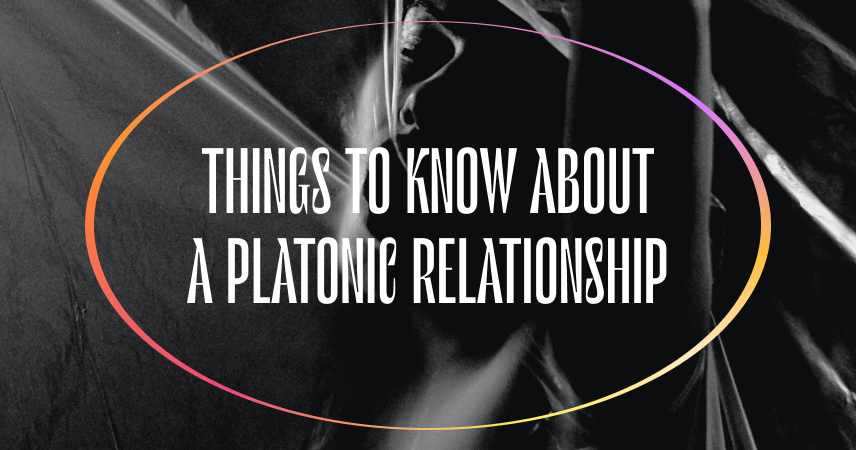
Platonic relationships typically refer to sharing a close bond with someone but not having sexual or romantic relationships with them. In other words, it refers to having strong feelings between platonic partners without romantic or sexual desire. So, let’s explore what it means and find the answers to all your platonic dating-related questions.
The Origins of Platonic Love
The platonic love concept originates from ancient times. The philosopher by the name of Plato believed this type of love between two people could bring them much closer. Plato called this deep connection a divine ideal. Even though today’s modern definition of platonic dating has a stark difference and is closer to the idea of people being friends rather than love interests, the term continues to reference Plato.
Today platonic love typically has the following characteristics:
- No sex or related activity
- No romance or romantic feelings
- No physical interaction between two people
- No sexual attraction of one person to another
The term can apply to people who are heterosexual and dating, but it can also apply to queer folks as well as those exploring bisexual dating opportunities. Platonic love does not limit people in terms of their sexual identity, sexual attraction to the opposite sex, gender orientation, sexual orientation, and/or romantic attraction.
Platonic Relationship Signs
Platonic dating is different from romantic or sexual physical contact. It is not the best friends with benefits scenario. There are several ways to distinguish it from other relationships. Some of them are:
- Sharing a close bond: People who are platonically dating have many things in common and share a quite deep connection.
- Being open with each other: Those in a platonic relationship often have no secrets from one other. They are honest about everything.
- Accepting each other’s flaws: Individuals who spend time together may feel a stronger emotional connection. Looks and sexual attractiveness are irrelevant to them even though they are dating.
- Understanding: Those who are exploring platonic dating respect and understand each other’s values and needs. They remain friends regardless of what life throws at them.
Platonic dating and relationships are often similar to friendships. That said, many people see a key difference. Those who practice platonic dating view their bond as something much deeper. Folks in platonic relationships may appreciate each other differently. There are things about the one person they may even find attractive. They may even have interests in romantic relationships but rarely experience physical attraction to act on their feelings.
Platonic Friends
People who are dating in platonic relationships may often label themselves as close friends rather than partners. Several different types of platonic relationships can go beyond the term just friends. One example may be the desire to date someone, at work without being romantically involved. Others are:
- Work husband/wife/spouse: This type of relationship often refers to co-workers who have a very close bond but are not involved in a sexual or romantic relationship
- Womance: This type of platonic relationship refers to two women or female-aligned individuals who share an emotional bond but are not in a sexual or romantic relationship
- Bromance: This type of relationship often refers to men or men-aligned individuals who are in a non-sexual/non-romantic relationship.
Can It Turn Into a Romantic Relationship?
Platonic relationships share a common theme. They are all about a strong and close bond between two (or more) people. Platonic relationships can be tremendously helpful to one’s mental and physical well-being. They may help build a strong and supportive network outside family and friends. That said, they can turn into romantic ones if both people experience sexual or romantic attraction.
By definition, a platonic relationship means no sexual or romantic intimacy between the people involved. However, if you develop feelings for your platonic friend and they reciprocate, who’s to say you are not allowed to date.
People love each other in a multitude of different ways, and platonic relationships are no exception here. It may be much easier to start a romantic relationship because of the close bond, acceptance, and understanding you already share.
Starting a Platonic Relationship
Starting a platonic relationship is not as easy as it may seem. It is all about building close bonds, breaking down the barriers, and connecting with someone on a deeper level. You can certainly try some of these things to help you develop a platonic relationship with someone:
- Join social networks, dating sites, and apps like Taimi to date like-minded people
- Sign up for classes, workshops, groups of interest
- Pick up a new hobby where you can meet new people.
- Join an organization that works with the cause that is close to your heart
These are just some of the ways to help you meet new people with whom you can form great bonds. They do not guarantee the fact that you will foster a platonic relationship with them. Platonic relationships are not always easy to start. Once you establish a strong bond with the person, it is crucial to nurture your connection and help strengthen it as much as possible. So be supportive of your friends and help them grow.
The Pros and Cons
Platonic relationships can have many benefits. Research shows that being involved in a platonic relationship can help lower stress levels and improve overall well-being. Platonic relationships often offer people added love and support, which in turn lower the risk of developing mental health issues.
Your friend can be the emotional support system you need to help you decrease stress levels that often lead to health issues like high blood pressure, anxiety, depression, decreased immunity, and so on. In addition to being an emotional support system, a platonic lover can provide validation, allyship, a helping hand, and be an active listener. According to a recent study on friendships – having a strong support system outside immediate family and romantic partners can help the person recover much faster from a traumatic event in their life.
There are also some cons to platonic relationships. Despite all the benefits, having a platonic partner can sometimes cause a rift in one’s romantic relationship. Some consider it emotional cheating, while others put too much pressure on their platonic partners by always confiding in them and seldom listening to their concerns. Remember, a platonic relationship is a two-way street. It is a relationship that also needs nurturing and acceptance, so do not make your platonic partner do all the work!
Being able to let go of your platonic relationship is also important to maintaining healthy relationships in the long run. So, if your platonic partner is creating added stress, saying hurtful things, or manipulating you – time to move on and find someone new to connect with, regardless of how painful it may seem at first.
Know Your Boundaries
Just like in any relationship, it is important to know your boundaries when you date someone. Platonic relationships have to have some rules in order to work for both of you in today’s world. Some of these boundaries may include:
- Limit the amount of complaining
- Do not engage in physical intimacy
- Do not be secretive about your platonic relationship
- Do not invade each other’s privacy
It is always best to have a real conversation about your expectations when it comes to friendship and relationships. Platonic partnerships can lead to romantic ones, but it is always better to talk your intentions over to avoid potential heartbreak.
The Takeaway
Platonic relationships are not the same as friendship or unrequited love. The main difference is that two people in platonic relationships are not interested in romantic connections. They share common interests, enjoy each other’s company, and love spending time together. Their strictly platonic bond may be with the same sex or not. It often stretches beyond attraction. That said, platonic lovers may end up a couple if both of them choose to at one point in time.
People love each other in a variety of different ways. Platonic is just one of the many options out there. Establishing clear boundaries, being honest and open with each other, and chatting about your expectations may help you have the platonic relationship of your dreams. When we love someone, we want the best for them. So, maintaining your platonic relationship with a friend is always the best route to take to maintain your friendship and relationship.





